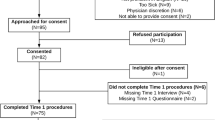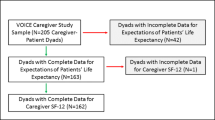Abstract
Purpose
Goals of care conversations have been suggested as a strategy for helping patients with advanced cancer manage the uncertainty and distress associated with end-of-life care. However, knowledge deficits about patient goals limit the utility of such conversations. We described the life and treatment goals of patients with incurable cancers, including goal values and expectancies. We examined the associations between paramount goals and patient prognosis, performance status, and psychological adjustment.
Methods
Patients with advanced lung cancer, gastrointestinal cancer, or melanoma (N = 84) completed measures of prognosis for 12-month survival, hope, optimism, depression, and anxiety. Oncologists provided patient performance status and prognosis for 12-month survival. We conducted interviews with a subset of patients (N = 63), eliciting life and treatment goals, values, and expectancies.
Results
Patient life goals resembled goals among healthy populations; whereas, treatment goals were perceived as separate and more important. Cure and fight cancer emerged as the most important goals. Patients who valued cure the most had worse performance status (M = 1.46 vs. 0.78) and more depressive symptoms (M = 6.30 vs. 3.50). Patients who valued fight cancer the most had worse self-prognosis (M = 69.23 % vs. 86.11 %), fewer treatment goals (M = 2.08 vs. 3.16), and lower optimism (M = 15.00 vs. 18.32).
Conclusions
Patients with advanced cancer perceive treatment goals as separate from and more important than life goals. They hold optimistic expectancies for achieving their goals and for survival. Valuing cure highly may put patients at risk for experiencing psychological maladjustment.

Similar content being viewed by others
Notes
Although we could hypothesize that some goals were implicitly related to the patient’s cancer (e.g., “To live another 20 years”), we chose to only categorize goals that explicitly mentioned cancer or its treatment in order to minimize the influence of the investigator’s subjective judgment.
References
Steinhauser KE, Christakis NA, Clipp EC, McNeilly M, McIntyre L, Tulsky JA (2000) Factors considered important at the end of life by patients, family, physicians, and other care providers. JAMA 284:2476–82
Wright AA, Zhang B, Ray A, Mack JW, Trice E et al (2008) Associations between end-of-life discussions, patient mental health, medical care near death, and caregiver bereavement adjustment. JAMA 300:1665–73
Miovic M, Block S (2007) Psychiatric disorders in advanced cancer. Cancer 110:1665–76
Zimmermann C, Burman D, Swami N, Krzyzanowska MK, Leighl N et al (2011) Determinants of quality of life in patients with advanced cancer. Support Care Cancer Off J Multinational Assoc Support Care Cancer 19:621–9
Smith AK, White DB, Arnold RM (2013) Uncertainty—the other side of prognosis. N Engl J Med 368:2448–50
Voogt E, van der Heide A, Rietjens JAC, van Leeuwen AF, Visser AP et al (2005) Attitudes of patients with incurable cancer toward medical treatment in the last phase of life. J Clin Oncol Off J Am Soc Clin Oncol 23:2012–9
Bradley EH, Bogardus ST Jr, Tinetti ME, Inouye SK (1999) Goal-setting in clinical medicine. Soc Sci Med 49:267–78
Fischer GS, Alpert HR, Stoeckle JD, Emanuel LL (1997) Can goals of care be used to predict intervention preferences in an advance directive? Arch Intern Med 157:801–7
Billings JA, Bernacki R (2014) Strategic targeting of advance care planning interventions: the goldilocks phenomenon. JAMA Intern Med
Von Roenn JH, von Gunten CF (2003) Setting goals to maintain hope. J Clin Oncol Off J Am Soc Clin Oncol 21:570–4
Nissim R, Rennie D, Fleming S, Hales S, Gagliese L, Rodin G (2012) Goals set in the land of the living/dying: a longitudinal study of patients living with advanced cancer. Death Stud 36:360–90
Burns CM, Broom DH, Smith WT, Dear K, Craft PS (2007) Fluctuating awareness of treatment goals among patients and their caregivers: a longitudinal study of a dynamic process. Support Care Cancer Off J Multinational Assoc Support Cancer 15:187–96
Quill T, Norton S, Shah M, Lam Y, Fridd C, Buckley M (2006) What is most important for you to achieve? An analysis of patient responses when receiving palliative care consultation. J Palliat Med 9:382–8
Carver CS, Scheier MF (1998) On the self-regulation of behavior. Cambridge University Press, New York
Cameron LD, Leventhal H (2003) Self-regulation, health, and illness: an overview. In: Cameron LD, Leventhal H (eds) The self-regulation of health and illness behaviour. Routledge, New York, pp 1–13
Carver CS, Scheier MF (1982) Outcome expectancy, locus of attribution for expectancy, and self-directed attention as determinants of evaluations and performance. J Exp Soc Psychol 18:184–200
Carver CS, Scheier MF (1994) Situational coping and coping dispositions in a stressful transaction. J Pers Soc Psychol 66:184–95
Scheier MF, Bridges MW (1995) Person variables and health: personality predispositions and acute psychological states as shared determinants for disease. Psychosom Med 57:255–68
Scheier MF, Carver CS (1987) Dispositional optimism and physical well-being: the influence of generalized outcome expectancies on health. J Personal 55:169–210
Scheier MF, Matthews KA, Owens JF, Magovern GJ Sr, Lefebvre RC et al (1989) Dispositional optimism and recovery from coronary artery bypass surgery: the beneficial effects on physical and psychological well-being. J Pers Soc Psychol 57:1024–40
Austin JT, Vancouver JB (1996) Goal constructs in psychology: structure, process, and content. Psychol Bull 120:338–75
Trinkaus M, Burman D, Barmala N, Rodin G, Jones J et al (2011) Spirituality and use of complementary therapies for cure in advanced cancer. Psychooncology 20:746–54
2012 Adults with advanced cancer still hope for cure. BMJ (Clin Res Ed) 345:e7272–e
Cunningham D, Starling N, Rao S, Iveson T, Nicolson M et al (2008) Capecitabine and oxaliplatin for advanced esophagogastric cancer. N Engl J Med 358:36–46
Moore MJ, Goldstein D, Hamm J, Figer A, Hecht JR et al (2007) Erlotinib plus gemcitabine compared with gemcitabine alone in patients with advanced pancreatic cancer: a phase III trial of the National Cancer Institute of Canada Clinical Trials Group. J Clin Oncol Off J Am Soc Clin Oncol 25:1960–6
Hochster HS, Hart LL, Ramanathan RK, Childs BH, Hainsworth JD et al (2008) Safety and efficacy of oxaliplatin and fluoropyrimidine regimens with or without bevacizumab as first-line treatment of metastatic colorectal cancer: results of the TREE Study. J Clin Oncol Off J Am Soc Clin Oncol 26:3523–9
Tournigand C, Andre T, Achille E, Lledo G, Flesh M et al (2004) FOLFIRI followed by FOLFOX6 or the reverse sequence in advanced colorectal cancer: a randomized GERCOR study. J Clin Oncol Off J Am Soc Clin Oncol 22:229–37
Sobrero AF, Maurel J, Fehrenbacher L, Scheithauer W, Abubakr YA et al (2008) EPIC: phase III trial of cetuximab plus irinotecan after fluoropyrimidine and oxaliplatin failure in patients with metastatic colorectal cancer. J Clin Oncol Off J Am Soc Clin Oncol 26:2311–9
Schiller JH, Harrington D, Belani CP, Langer C, Sandler A et al (2002) Comparison of four chemotherapy regimens for advanced non-small-cell lung cancer. N Engl J Med 346:92–8
Kaldjian LC, Curtis AE, Shinkunas LA, Cannon KT (2009) Goals of care toward the end of life: a structured literature review. Am J Hosp Palliat Med 25:501–11
Snyder CR, Harris C, Anderson JR, Holleran SA, Irving LM et al (1991) The will and the ways: development and validation of an individual-differences measure of hope. J Pers Soc Psychol 60:570–85
Scheier MF, Carver CS, Bridges MW (1994) Distinguishing optimism from neuroticism (and trait anxiety, self-mastery, and self-esteem): a reevaluation of the life orientation test. J Pers Soc Psychol 67:1063–78
Zigmond AS, Snaith RP (1983) The hospital anxiety and depression scale. Acta Psychiatr Scand 67:361–70
Smith AB, Selby PJ, Velikova G, Stark D, Wright EP et al (2002) Factor analysis of the Hospital Anxiety and Depression Scale from a large cancer population. Psychol Psychother Theory Res Pract 75:165–76
Cripe LD, Rawl SM, Schmidt KK, Tong Y, Monahan PO, Rand KL (2012) Discussions of life expectancy moderate relationships between prognosis and anxiety or depression in men with advanced cancer. J Palliat Med 15:99–105
Bjelland I, Dahl AA, Haug TT, Neckelmann D (2002) The validity of the Hospital Anxiety and Depression Scale: an updated literature review. J Psychosom Res 52:69–77
Pinquart M, Fröhlich C, Silbereisen RK (2008) Testing models of change in life goals after a cancer diagnosis. J Loss Trauma 13:330–51
El-Jawahri A, Traeger L, Park ER, Greer JA, Pirl WF et al (2014) Associations among prognostic understanding, quality of life, and mood in patients with advanced cancer. Cancer 120:278–85
Weeks JC, Catalano PJ, Cronin A, Finkelman MD, Mack JW et al (2012) Patients’ expectations about effects of chemotherapy for advanced cancer. N Engl J Med 367:1616–25
Taylor SE, Brown JD (1988) Illusion and well-being: a social psychological perspective on mental health. Psychol Bull 103:193–210
Chochinov HM, Tataryn DJ, Wilson KG, Enns M, Lander S (2000) Prognostic awareness and the terminally ill. Psychosom J Consult Liaison Psychiatry 41:500–4
Stadler G, Oettingen G, Gollwitzer PM (2010) Intervention effects of information and self-regulation on eating fruits and vegetables over two years. Health Psychol 29:274–83
Acknowledgments
This research was supported by a research scholar grant (RSGPB-10-014-01-CPPB) from the American Cancer Society awarded to the first author.
Author information
Authors and Affiliations
Corresponding author
Rights and permissions
About this article
Cite this article
Rand, K.L., Banno, D.A., Shea, A.M. et al. Life and treatment goals of patients with advanced, incurable cancer. Support Care Cancer 24, 2953–2962 (2016). https://doi.org/10.1007/s00520-016-3113-6
Received:
Accepted:
Published:
Issue Date:
DOI: https://doi.org/10.1007/s00520-016-3113-6




